Japan-United Kingdom Relations
Japan-U.K. Summit Meeting
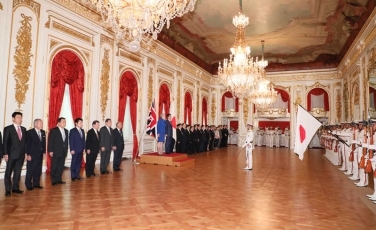 (Photo: Cabinet Public Relations Office)
(Photo: Cabinet Public Relations Office)
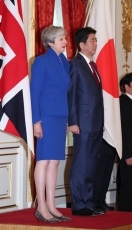 (Photo: Cabinet Public Relations Office)
(Photo: Cabinet Public Relations Office)
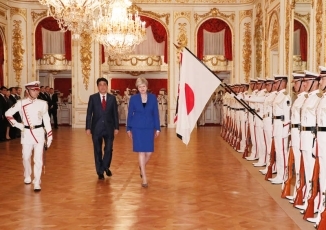 (Photo: Cabinet Public Relations Office)
(Photo: Cabinet Public Relations Office)
On August 31, commencing at 5:25 p.m. for approximately 60 minutes, Mr. Shinzo Abe, Prime Minister of Japan, held a Japan-U.K. Summit Meeting with the Rt Hon Theresa May MP, Prime Minister of the United Kingdom, who was paying an official visit to Japan. The overview of the meeting is as follows:
In addition, on the occasion of this Summit Meeting the two leaders issued the “Japan-U.K. Joint Vision Statement (English (PDF) / Japanese (PDF)
/ Japanese (PDF) ),” “Japan-U.K. Joint Declaration on Security Cooperation (English (PDF)
),” “Japan-U.K. Joint Declaration on Security Cooperation (English (PDF) / Japanese (PDF)
/ Japanese (PDF) ),” “Japan-U.K. Joint Declaration on Prosperity Cooperation (English (PDF)
),” “Japan-U.K. Joint Declaration on Prosperity Cooperation (English (PDF) / Japanese (PDF)
/ Japanese (PDF) )” and “Joint Statement on North Korea (English (PDF)
)” and “Joint Statement on North Korea (English (PDF) / Japanese (PDF)
/ Japanese (PDF) )”.
)”.
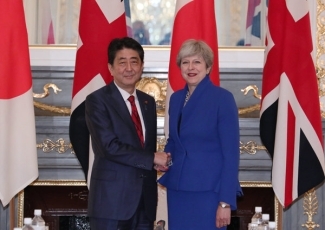 (Photo: Cabinet Public Relations Office)
(Photo: Cabinet Public Relations Office)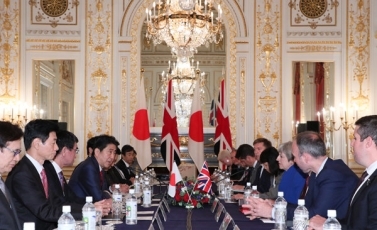 (Photo: Cabinet Public Relations Office)
(Photo: Cabinet Public Relations Office)
1. Opening remarks
Prime Minister Abe welcomed Prime Minister May’s first visit to Japan, and explained that in this changing and uncertain era, Japan was attaching greater importance to the U.K. as a global strategic partner sharing fundamental values such as freedom, democracy, human rights and the rule of law. Prime Minister Abe also expressed respect for Prime Minister May’s leadership in steering the U.K. toward its exit from the European Union (EU) . Prime Minister May expressed her gratitude for the warm welcome and stated that she hoped to develop the U.K.’s relationship with Japan, an important partner with shared values.
The two leaders committed that Prime Minister May’s visit to Japan would provide major momentum for elevating the Japan-U.K. relationship to the new level, and that they would further develop the Japan-U.K. relations.
2. Security and defense cooperation
(1) General remarks
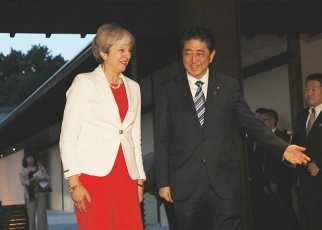 (Photo: Cabinet Public Relations Office)
(Photo: Cabinet Public Relations Office)
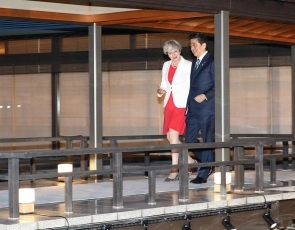 (Photo: Cabinet Public Relations Office)
(Photo: Cabinet Public Relations Office)
(2) Countering terrorism and violent extremism
The two leaders shared the view that it would be important for each country to draw on its respective strengths, and to pursue measures in which both countries mutually complement and generate synergies. They shared the view that Japan and the U.K. would coordinate closely.
(3) Cyber security
Prime Minister Abe stated that Japan hoped to learn from the rich experience of the U.K. in order to ensure Japan’s cybersecurity measures are thorough in the run up to the holding of the Tokyo Olympic and Paralympic Games in three years. The two leaders shared the view that they would work closely together to realize a free, open and safe cyberspace.
3. Economy
(1) Exit of the U.K. from the EU
Prime Minister Abe explained that he was watching closely the UK’s negotiation to leave the EU, and stated that Japan supports a strong Europe. Prime Minister Abe further stated that Japan would like to strengthen cooperation with a united Europe, including the U.K., for the peace and stability of the international community after the exit of the U.K. from the EU. Prime Minister Abe also requested that consideration for ensuring transparency and predictability as well as establishing a transition period in order to minimize the impact of the exit on companies. Prime Minister May responded that the U.K. would achieve a smooth and orderly transition while listening to the opinions of Japanese companies.
(2) Japan-EU Economic Partnership Agreement (EPA)
Prime Minister Abe stated that he intended to make steady progress with the process toward the prompt entry into force of the Japan-EU EPA so that Japan and Europe could demonstrate their stance to further advance free trade. The two leaders confirmed they would continue to cooperate toward the final agreement on the Japan-EU EPA and its prompt entry into force.
(3) Japan-U.K. economic relations
The two leaders shared the view that they would work closely together to strengthen the Japan-U.K. economic relations after the exit of the U.K. from the EU, under the strong engagement at the political level.
(4) Import restrictions
Prime Minister Abe explained that recovery from the Great East Japan Earthquake was a top priority, and requested cooperation with lifting import restrictions on foods from Fukushima Prefecture where they have been scientifically verified as safe. Prime Minister May replied that she would make efforts to it.
4. Global prosperity and growth
The two leaders shared the view that Japan and the U.K. would coordinate to lead international initiatives to share knowledge with the international community in response to global challenges such as declining birthrates, health, promoting women’s empowerment, developing quality infrastructure and achieving the Sustainable Development Goals.
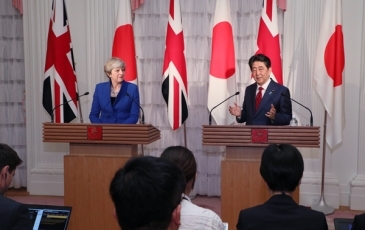 (Photo: Cabinet Public Relations Office)
(Photo: Cabinet Public Relations Office)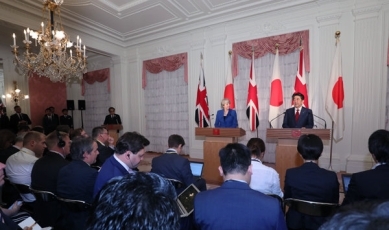 (Photo: Cabinet Public Relations Office)
(Photo: Cabinet Public Relations Office)
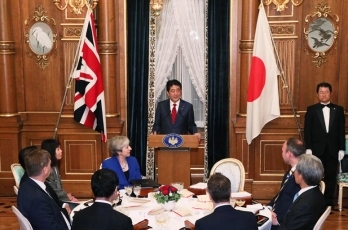 (Photo: Cabinet Public Relations Office)
(Photo: Cabinet Public Relations Office)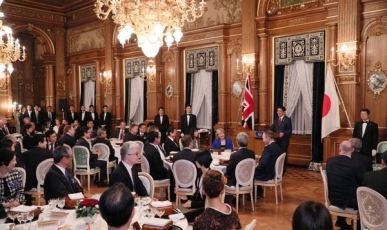 (Photo: Cabinet Public Relations Office)
(Photo: Cabinet Public Relations Office)

